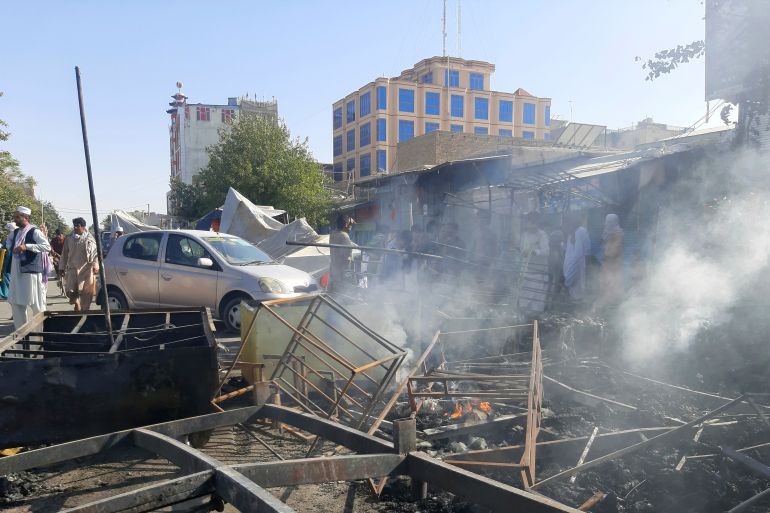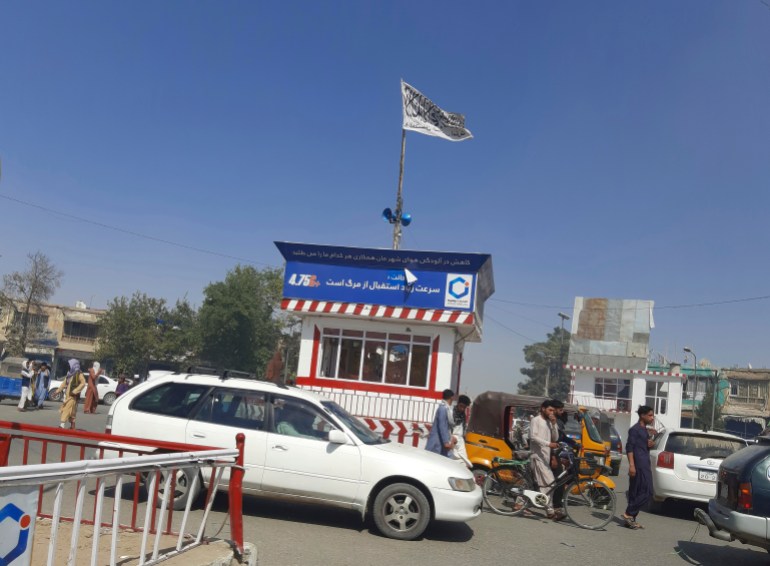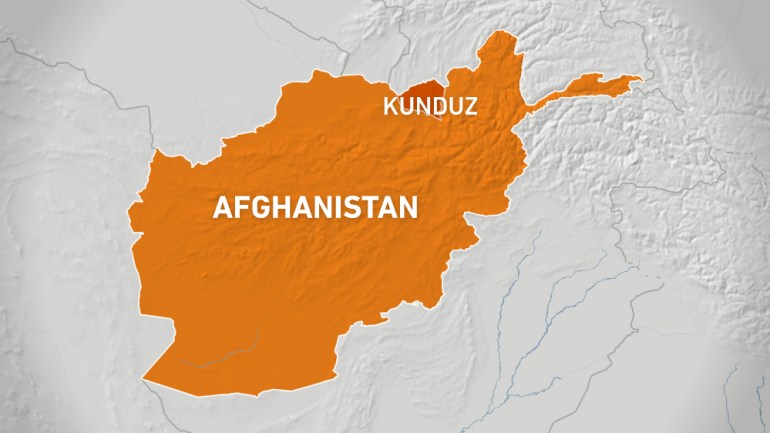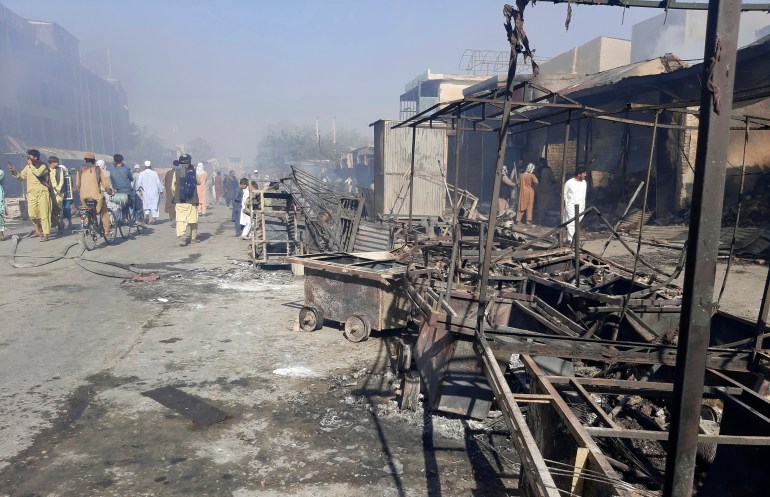Residents of Afghanistan’s Kunduz recount Taliban takeover
Locals report fear and destruction as the Taliban seizes Afghanistan’s fifth-largest city for the third time in seven years.

Kabul, Afghanistan – Late on Sunday afternoon, the Taliban flew its flag from the main roundabout in the northern city of Kunduz.
It marked the third time in seven years that the armed group had managed to wrest control of what the government had hoped would be a model for all of Afghanistan’s 34 provinces.
Keep reading
list of 3 itemsWhat will happen to Afghanistan’s CIA-backed militias?
As fighting rages in Afghanistan, health workers are struggling
Kunduz is the fifth northern provincial capital to fall to the Taliban in less than a week, and the sixth overall in the country. The fall of the cities come amid an intensifying Taliban offensive as US and NATO forces complete their final withdrawal from Afghanistan.
Residents speaking to Al Jazeera said the Taliban’s offensive on the eponymous capital began early on Saturday morning and by the next afternoon, the group had officially seized control of Afghanistan’s fifth-largest city.
Farhad, a shopkeeper who would only give his first name, said the city’s marketplaces are in shambles.
Hundreds of storefronts have been destroyed in the fighting, leaving thousands of people without an income until they can rebuild.
However, as fighting continues in the city, that financial uncertainty could last for days, if not weeks at a time when the Afghan economy has already been devastated by growing insecurity and the COVID-19 pandemic.

A video posted by the defence ministry on Saturday showed commandos patrolling and firing from the area around one of the city’s shuttered markets.
Residents speaking to Al Jazeera said the city’s main market caught fire from a government air raid targeting a nearby Taliban hideout on Sunday.
Farhad’s electronics store was near the city’s main roundabout, it too was destroyed in the fire.
He said the air attack turned hundreds of shops into ash in a matter of minutes.
“There are air strikes and clashes on the ground, who can go and put out the fires?” Farhad said.
As aircraft continues to fly across the Kunduz skies, residents remained locked in their homes, afraid of venturing out and risk being caught in the crossfire.
Zabardarst Safi, the provincial police chief, said the security forces were continuing with their operations and trying to clear the city of the Taliban, but that the armed group was creating extra challenges by entering civilian homes.
“The Taliban are in residential areas, so we have to be extra cautious to not harm civilians.”
He said caution may delay the government’s efforts to regain control of the city.
Other residents said despite their claims of bringing order, the Taliban immediately began firing on civilians and security forces.
The Kunduz Regional Hospital said that by Monday, they had treated at least 97 wounded patients.
A further 14 patients were declared dead on arrival. All were civilians.
However, residents said the actual number of casualties may be much higher as hundreds of residents remain trapped in their houses, afraid of venturing outside.
Civilian casualties
The reliance on air attacks by government forces and the use of mortars by the Taliban have led to increased civilian casualties in recent days, residents in Kunduz told Al Jazeera by phone.
A video purporting to show a Taliban-fired mortar hitting a residential property and killing a young man has made the rounds online, and is being used as proof of indiscriminate attacks on civilian areas.
Those who can make it out, often end up rushing their dead to nearby cemeteries for burial, rather than risking a journey of even 15 minutes to the city’s main hospital, which is located on the way to the intelligence directorate and the governor’s compound, both of which had fallen into Taliban hands.
Though Afghanistan’s Defence Ministry posted a video of an air attack on supposed Taliban hideouts on the outskirts of the city, residents said the Afghan National Security Forces have suffered heavy casualties over the last 72 hours.
Farzad, another Kunduz resident, said his brother, an injured policeman, was at the provincial police headquarters when the Taliban stormed into the compound on Sunday morning.
Farzad said his brother was shot on site, adding that the Taliban started firing upon entering the compound, leaving dozens of policemen dead and injured.
Even those people who managed to escape remain afraid.
Sediqa Sherzai, who runs a local radio and TV outlet in the city, fled to Kabul 12 days ago – just as she had in 2015, when the Taliban first took Kunduz.
In recent weeks, Sherzai and her family had received repeated warnings from the Taliban to end their broadcasts. As the group moved closer to the city, her family’s fear grew.
Because her offices had already been burned down once by the Taliban six years ago, they took the threats seriously, and in late July, the family moved to Kabul.
“I have been personally threatened. I can tell you that the Taliban do not want women working in the media or even going out in public,” Sherzai said.
But Sherzai said she was not alone, as dozens of other female activists and professionals have fled the province in recent weeks.
‘No one to hear our voices’
Fawzia Yaftali, deputy head of the Kunduz provincial council, said the latest Taliban takeover was another example of government neglect towards their province.
Over the last six years, the province has been witnessing high rates of crime and growing drug trade.
Residents said local security and government officials had a hand in that trade, along with mafias that relied on the Taliban for protection along trafficking routes.
Additionally, for years, Kunduz has suffered from the violence of air and drone attacks and the alleged abuses of strongmen supported by the government.
All of which, residents like Yaftali say, weakened government and security institutions in their already vulnerable province.
Yaftali said that on Friday, she and other local leaders, asked the defence and interior ministries for assistance, but that their calls went unanswered.
“We informed senior officials in Kabul to take some sort of measure for Kunduz because the Taliban are planning a major attack on the city, but they didn’t take our warning our seriously,” Yaftali said.

Yaftali and other Kunduz residents said the other eight districts in the province had been in the hands of the Taliban for months.
This is despite the fact that in 2015, President Ashraf Ghani had hoped to use Kunduz as an example of the sweeping security reforms he wanted to bring all of the nation’s provinces.
Residents say rather than securing the province, Kunduz has become increasingly unsafe with each passing year.
“There is no one to hear our voices,” said Farhad, the shopkeeper, “except for God”.